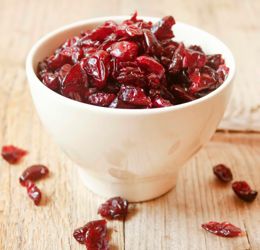Dried cranberries are just like other dried fruits, that offer several health benefits. This article provides some information about their nutrition facts and the health benefits that they offer.

The most popular cranberry products are their juice, sauce, and dried fruit forms. Dehydrated or dried cranberries are available in all health stores. Cranberry is obtained from evergreen dwarf shrubs or trailing vines belonging to the genus Vaccinium and subgenus Oxycoccos. The various canned varieties of this dry fruit are available in markets.
Dried cranberries are common in the cooler areas of the Northern hemisphere. Cranberries are a major crop in the US. The plant grows low to the ground like a vine. The leaves of the plant are smaller than the berries and the berries are white until they ripen to a deep red. Their dried fruits are tart and sweet and are added to salads, trail mix, muffins, and thanksgiving dinners. Their deep red color makes the dish very attractive. White cranberries, or the ones that are harvested before they turn the familiar deep red color, are used primarily in white cranberry juices. Dehydrated cranberries are usually sweetened to alleviate tartness.
Nutritional Value
100g of sweetened dried cranberries contain:
- Ash - 0.20 g
- Calcium, Ca - 10 mg
- Copper, Cu - 0.080 mg
- Carbohydrate, by difference - 82.36 g
- Energy - 308 kcal
- Fatty acids, total polyunsaturated - 0.658 g
- Fatty acids, total monounsaturated - 0.198 g
- Fatty acids, total saturated - 0.103 g
- Fiber, total dietary - 5.7 g
- Iron, Fe - 0.53 mg
- Lutein + zeaxanthin - 33 mcg
- Manganese, Mn - 0.265 mg
- Magnesium, Mg - 5 mg
- Niacin - 0.990 mg
- Pantothenic acid - 0.217 mg
- Potassium, K - 40 mg
- Phosphorus, P - 8 mg
- Protein - 0.07 g
- Riboflavin - 0.016 mg
- Selenium, Se - 0.5 mcg
- Sodium, Na - 3 mg
- Sugars, total - 65.00 g
- Thiamin - 0.007 mg
- Total lipid (fat) - 1.37 g
- Vitamin B6 - 0.038 mg
- Vitamin C, total ascorbic acid - 0.2 mg
- Vitamin E (alpha-tocopherol) - 1.07 mg
- Vitamin K (phylloquinone) - 3.8 mcg
- Water - 16.00 g
- Zinc, Zn - 0.11 mg
Health Benefits
- This dried fruit is high in Vitamin C and antioxidants. It helps to reduce the effect of free radicals and thus, inhibits the development of cancer cells.
- It can inhibit bacterial infections and so are used widely for treating urinary tract infections and also ear and mouth infections.
- They are believed to help against atherosclerosis which is a condition wherein there is hardening of the walls of the arteries.
- They are packed with vitamins and hence cranberry concentrate pills are sold in the vitamin section of the supermarket.
- They offer cardiovascular benefits and help to strengthen the immune system.
- They are even suspected of helping fight tooth decay.
- The dietary fiber in the same helps improve one's digestive health.
- Their juice helps in the prevention of kidney stones. It also offers protection against Alzheimer's disease and Parkinson's disease. Further, it helps to avoid the excessive use of oral antibiotics as it prevents a kind of rash, called jock itch, caused by a fungal infection.
- Cranberries help to maintain good cholesterol levels. If fresh cranberries are not available, one can use the dried ones after soaking them in water.
- Cranberries help in the detoxification of one's body and they also contain vitamin E. So, one can get glowing skin if one starts their consumption in the proportionate quantity.
Various research studies are being carried out to confirm the nutritional benefits of cranberry. Considering the aforementioned nutrition facts of this dried fruit, they are used in various products like cranberry pumpkin bread, salads, and cereals.
Disclaimer:
This article is for informative purposes only and does not in any way attempt to replace the advice offered by an expert on the subject.






 The most popular cranberry products are their juice, sauce, and dried fruit forms. Dehydrated or dried cranberries are available in all health stores. Cranberry is obtained from evergreen dwarf shrubs or trailing vines belonging to the genus Vaccinium and subgenus Oxycoccos. The various canned varieties of this dry fruit are available in markets.
The most popular cranberry products are their juice, sauce, and dried fruit forms. Dehydrated or dried cranberries are available in all health stores. Cranberry is obtained from evergreen dwarf shrubs or trailing vines belonging to the genus Vaccinium and subgenus Oxycoccos. The various canned varieties of this dry fruit are available in markets.